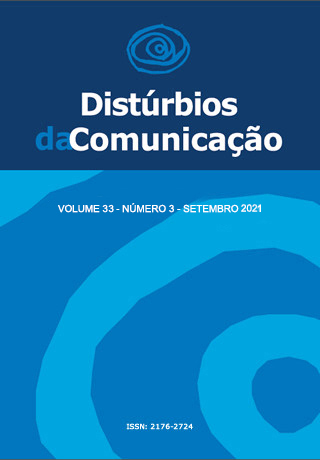Research practices of the Speech-Language Pathologist in Portugal:
Needs, barriers and facilitators
DOI:
https://doi.org/10.23925/2176-2724.2021v33i3p375-387Keywords:
Research, Speech, language and hearing sciences, Speech-language pathology, Evidence-based practiceAbstract
Introduction: Speech-language pathologists’ (SLPs) research needs and interests have been increasing over the years. Objectives: (i) characterize the SLPs’ current research autonomy level in Portugal; (ii) characterize the SLPs’ desired research autonomy level in Portugal; (iii) characterize the SLP’s training needs as well as identify barriers and facilitators of the research practice in Portugal. Methods: 86 SLPs completed a questionnaire validated by a panel of experts. The data collection focused on: (i) current and desired research practice autonomy level; (ii) barriers and facilitators inherent to the research practice. Results: The current research autonomy levels were significantly lower than the desired levels (p<0.001). The current autonomy level of conceptualizing a research idea was significantly lower when compared to several tasks, such as defining methodology (p<0.05), data analysis (p<0.001), data processing (p<0.001) and results synthesis (p<0.001). There was no difference in autonomy between a conference communication task and research idea conceptualization task (p>0.05). Most of SLPs reported the need for additional training in order to integrate research into their clinical practice. The main barrier to conducting research was the lack of time (64.5%). The main facilitator suggested was increasing the available time (27.7%). Conclusion: SLPs have the desire to have greater autonomy in the research process. The identification of barriers and facilitators may allow a more adequate response to the research competences and needs of SLPs.
Downloads
References
Diário da República. Despacho no 7051/2017. (2.a série — N.o 155). 2017.
Mendes AP, Moreira M, Guerreiro D, Nascimento D, Tello Rodrigues I, de Aguiar, V. Práticas e competências de investigação do Terapeuta da Fala em Portugal. Rev. Port. Ter. da Fala. 2020; 10: 25–34.
Batista JS. O perfil do terapeuta da fala em Portugal [Tese]. Aveiro: Universidade de Aveiro - UA; 2011.
Finch E, Cornwell P, Ward EC, McPhail SM. Factors influencing research engagement: Research interest, confidence and experience in an Australian speech-language pathology workforce. BMC Health Serv. Res. 2013,13:144.
Schubert A. What speech therapists, occupational therapists and physical therapist need to know to become evidence-based practitioners: A cross-sectional study. Z. Evid. Fortbild. Qual. Gesundhwes. 2019; 140: 43–51.
Mendes AP, Martins P, Alarcão I, Melo E, Pereira JC, Rua M, Brandão P, Costa R, Sancho L. Clinical education reflective ecological model for health science majors. Distúrb. comun. 2007; 293–303.
Albarqouni L, Hoffmann T, Straus S, Olsen NR, Young T, Ilic D, Shaneyfelt T, Haynes RB, Guyatt G, Glasziou P. Core Competencies in Evidence-Based Practice for Health Professionals: Consensus Statement Based on a Systematic Review and Delphi Survey. JAMA Netw Open. 2018; 1(2):e180281.
Black AT, Balneaves LG, Garossino C, Puyat JH, Qian H. Promoting Evidence-Based Practice Through a Research Training Program for Point-of-Care Clinicians. JONA J. Nurs. 2015; 45(1): 14-20.
Gerrish K, Ashworth P, Lacey A, Bailey J. Developing evidence-based practice: experiences of senior and junior clinical nurses. J Adv Nurs. 2008; 62(1): 62-73.
Association American Speech and Hearing. Evidence-Based Practice (EBP). [cited 2020 august 4] Available from: https://www.asha.org/Research/EBP/Evidence-Based-Practice/
Melnyk BM, Gallagher-Ford L, Long LE, Fineout-Overholt E. The establishment of evidence-based practice competencies for practicing registered nurses and advanced practice nurses in real-world clinical settings: proficiencies to improve healthcare quality, reliability, patient outcomes, and costs. Worldviews Evid Based Nurs. 2014;11(1): 5-15.
Melnyk BM, Fineout-Overholt E, Gallagher-Ford L, Kaplan, L. The state of evidence-based practice in US nurses: critical implications for nurse leaders and educators. J Nurs Adm. 2012; 42(9): 410-7.
Holmqvist R, Philips B, Barkham M. Developing practice-based evidence: Benefits, challenges, and tensions. Psychother. Res. 2015; 25: 20–31.
Roddam H, Skeat J. Embedding evidence-based practice in speech and language therapy: International examples. 1ª edição,Wiley-Blackwell; 2010.
Cristo S. Regulação da satisfação de necessidades psicológicas ao longo do processo psicoterapêutico: um caso clínico de prática baseada na evidência a gerar evidência baseada na prática [Tese]. Lisboa: Universidade de Lisboa - UL; 2013.
Clarisse AL. Prática baseada na evidência em terapia da fala [Tese]. Lisboa: Escola Superior de Tecnologia da Saúde de Lisboa; 2013.
Greenwell T, Walsh B. Evidence-Based Practice in Speech-Language Pathology: Where Are We Now? Am. J. speech-language Pathol. 2021; 30: 186-198.
Alhaidary, A. Evidence-Based Practice Patterns Among Speech-Language Pathologists and Audiologists in Saudi Arabia. Commun. Disord. Q. 2020; 41: 242–249.
Dodd B. Evidence-based practice and speech-language pathology: Strengths, weaknesses, opportunities and threats. Folia Phoniatr. Logop. 2007; (59): 118–29.
R Core Team. R: A Language and Environment for Statistical Computing. [cited 2020 Aug 7]. Available from: https://www.R-project.org/
Mansuri, Tohidast SA, Zareei M. Knowledge, attitude, and practice of iranian speech and language pathologists toward evidence-based practice. Middle East J. Rehabil. Heal. 2020; 7: 1–6.
Currey J, Considine J, Khaw. Clinical nurse research consultant: a clinical and academic role to advance practice and the discipline of nursing. J. Adv. Nurs. 2011; 67: 2275–2283.
Downloads
Published
Issue
Section
License
Copyright (c) 2021 Ana P. Mendes, Miriam Moreira, David Guerreiro, David Nascimento, Inês Tello Rodrigues, Vânia de Aguiar

This work is licensed under a Creative Commons Attribution 4.0 International License.









